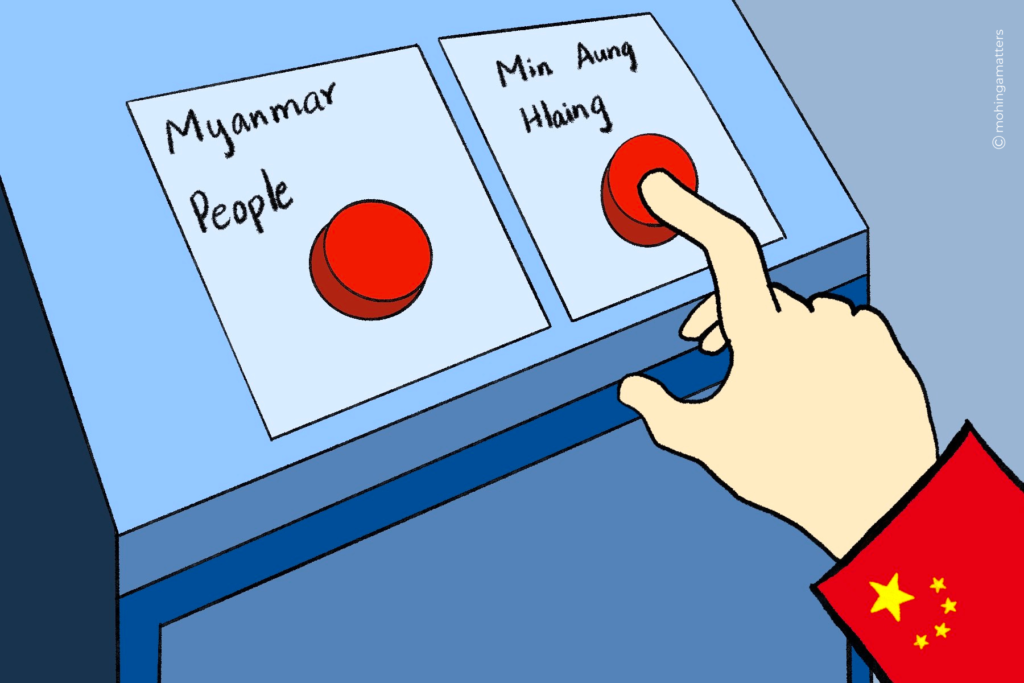
Foreign Minister Wang Yi visiting Myanmar and meeting with the current junta Min Aung Hlaing, the previous junta Than Shwe, and other top brass from junta’s circles, China publicly declaring “3 uncrossable lines” in handling crisis in Myanmar (1. No civil war in Myanmar, 2. No exclusion by ASEAN towards Myanmar and 3. No foreign interference in Myanmar) during China-Laos-Myanmar-Thailand foreign ministers meeting, a new ambassador getting appointed and meeting with high ranking military and cabinet officials at junta’s administration, i.e. the State Administration Council (SAC) on a daily basis, and culminating with an alleged letter from Yunnan Government threatening an increasingly powerful Ta’ang National Liberation Army (TNLA) to cease conflict or face consequences, it has been a busy month in China-Myanmar relations.
Since Min Aung Hlaing staged the coup three years ago, China faced the most blame from the people of Myanmar, for both fair and unfair reasons alike. Furthermore, as the conflict intensified, to say Chinese interests in Myanmar got complicated would be a massive understatement. However, China faces the crisis unfolding in Myanmar with utmost calmness. It seems as if this 5000-year-old civilization sees whatever is happening in their southern neighbors will come to pass and the people of Myanmar, regardless of age, gender, race, religion, education attainment, wealth, or any differences, will come to see the light in the Chinese way. Over the past three years, despite changes in the ground situation, China showed little sign of reformulating its approach.
The coup posed many challenges to Chinese interests in Myanmar, however, China demonstrated time and time again that the solution for these challenges lies in achieving stability in Myanmar, which (China seems to that) is possible only by leveraging different armed groups, both SAC and rivaling ethnic armed organizations (EAOs). Thus, the very first reaction of the coup was not to denounce democratic countries but rather to work together with the military rulers toward the path of peace and stability. In contrast to some accusations of China supporting SAC, we do not see that China likes or trusts SAC, but rather we regard that it betted on SAC as the best option to protect its interests in Myanmar. What is clear is that, in China’s equation on Myanmar, ordinary people do not matter. Similarly, the National Unity Government (NUG), which holds the mandate of the democratic electoral process of the 2020 Myanmar General Elections, was never given a serious public engagement by China.
Three years on, China’s betting to ignore the people’s voices has backfired horribly. Myanmar couldn’t be further from peace and stability, SAC is losing grounds massively to protect Chinese investments and other interests well, and even in the midst of withstanding carnage and smoldering villages, the people’s resistance to military rule marched on. Regardless of what happens next, what is clear is that SAC cannot win this war.
However, despite all these changes in the Myanmar conflict, China still seems to be adamant about its flawed approach in considering the junta as the potential winner over the people. It is one thing for Min Aung Hlaing to consider the way out of his problems, which started due to injustice and wanton violence, is more injustice and more violence, however, it defies logic to see the brilliant minds among Chinese government behaving as if they think the way to achieving peace in Myanmar (and thus offering a stable environment for Chinese interests) is not through forsaking the junta and his administration but rather engaging even more.
Having said that, in some ways, we could see why China might prefer the current unreliable and incapable military junta over the federal democratic government we the pro-revolution people constantly talk about. Myanmar’s Spring Revolution, which started as a peaceful resistance against a military coup gained momentum this far in our dislike for oppression and determination to pay the ultimate price to achieve freedom from military rule. However, for outsiders and foreign powers whose policies lie on the attainment of their own national interest, guarantees of what kind of future we are going to build after the fall of military dictatorship, and more importantly whether our envisioned future aligns with their national interest will be critical to make a decision. Admittedly, the reality is that despite gains militarily, there is not much progress politically to convince China to re-think its engagement with the junta.
Here we are only talking about China because of its position as a neighboring (big-brother) superpower and its historical (since the coup) and recent flurry of engagement with the junta. However, our inability to sell our future (despite our belief and will to make it bright) remains a serious flaw in engagement with any foreign countries.
Creation of concrete steps for a credibly brighter future is our task primarily, and we are convinced that the people of Myanmar, after withstanding massive atrocities in our fight against oppression and after coming this far, will bridge this gap in a matter of time, whether China keeps its bets on SAC or not.
As for China, right now it still has an opportunity to ensure peace, stability, and protection of its long-term interests in Myanmar. But to do that would require massive reformulating of its engagements, and not to discount the voice and determination of the people of Myanmar.

